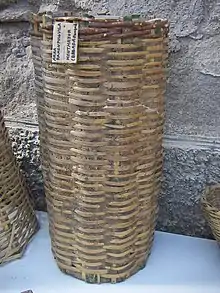arna
Asturian
Etymology
Probably from a a pre-Roman substrate of Iberia, from Proto-Celtic *arona (“ring” or “wheel”) due to the cylindrical shape around the trunk of a tree.
Noun
arna f (plural arnes)
- bark, especially of the oak or chestnut tree
- vessel made of bark
- Les tendeláes nos puebros facíenles les muyeris en inḷḷiendo les arnes con ḷḷexía .
- In the villages, the women used to fill bark vessels with lye to hang the laundry.
- bark shavings
- Dái-yes més xintar les vueses xates ca paecin afamiáes comu les arnes anguañes.
- Give your cows more to eat because they look as hungry as last year's shavings.
Catalan
Etymology 1

Probably from Proto-Celtic *arona (“ring” or “wheel”) due to these structures first being built in a cylindrical form from woven wood or vegetation.
Holonyms
- (beehive): apiari
Derived terms
Etymology 2
Unknown origin, but possibly cognate to Basque arr (“worm, insect”). Cognate to Occitan arna and Sardinian arna.
Etymology 3
Possibly the same origin as Etymology 2 above, but also possibly by refactoring of sarna (“scabies”) as s’ + arna.
Further reading
- “arna” in Diccionari de la llengua catalana, segona edició, Institut d’Estudis Catalans.
- “arna”, in Gran Diccionari de la Llengua Catalana, Grup Enciclopèdia Catalana, 2024
- “arna” in Diccionari normatiu valencià, Acadèmia Valenciana de la Llengua.
- “arna” in Diccionari català-valencià-balear, Antoni Maria Alcover and Francesc de Borja Moll, 1962.
Galician
Etymology
Uncertain. Probably from a a pre-Roman substrate of Iberia, from *arona (“ring”, “wheel”, "rim"); ultimately from Proto-Indo-European.[1] Cognate with Asturian arna and Catalan arna
Pronunciation
- IPA(key): [ˈaɾnɐ]
Noun
arna f (plural arnas)
Derived terms
References
- “arna” in Dicionario de Dicionarios da lingua galega, SLI - ILGA 2006–2013.
- “arna” in Tesouro informatizado da lingua galega. Santiago: ILG.
- “arna” in Álvarez, Rosario (coord.): Tesouro do léxico patrimonial galego e portugués, Santiago de Compostela: Instituto da Lingua Galega.
- Joan Coromines, José A. Pascual (1983–1991) “arna”, in Diccionario crítico etimológico castellano e hispánico (in Spanish), Madrid: Gredos
Icelandic
Irish
Contraction
arna
- used with a verbal noun to indicate completion of an action and its direct object
- ‘upon his/its’ / ‘when he/it’ (triggers lenition): arna shailleadh ― upon its being salted, when it had been salted
- ‘upon her/its’ / ‘when she/it’ (triggers h-prothesis): arna hinsint ― upon its being told, when it had been told
- ‘upon their’ / ‘when they’ (triggers eclipsis): arna ndearbhú i gcruatan ― upon their being tested in hardship, when they were tested in hardship
- used to form the equivalent of a past participle that agrees with a third-person subject
- masculine singular agreement triggers lenition: arna chur in eagar ag ― edited by (of something masculine)
- feminine singular agreement triggers h-prothesis: arna hoscailt ― (being) opened (of something feminine)
- plural agreement triggers eclipsis: arna bhfoilsiú ag ― published by (of something plural)
Related terms
Further reading
- Ó Dónaill, Niall (1977) “arna”, in Foclóir Gaeilge–Béarla, Dublin: An Gúm, →ISBN
- Entries containing “arna” in English-Irish Dictionary, An Gúm, 1959, by Tomás de Bhaldraithe.
- Entries containing “arna” in New English-Irish Dictionary by Foras na Gaeilge.
Occitan
Etymology
(This etymology is missing or incomplete. Please add to it, or discuss it at the Etymology scriptorium.) Cognate with Catalan arna and Sardinian arna.
Pronunciation
- IPA(key): /ˈarno/
Audio (file)
References
- Gui Benoèt, "Las bèstias", 2008, Toulouse, IEO Edicions, 2008, →ISBN, p. 60
Old Irish
Pronunciation
- IPA(key): [ˈar͈n͈a]
Conjunction
arna (triggers /h/-prothesis)
- so that … not, lest
- c. 800, Würzburg Glosses on the Pauline Epistles, published in Thesaurus Palaeohibernicus (reprinted 1987, Dublin Institute for Advanced Studies), edited and with translations by Whitley Stokes and John Strachan, vol. I, pp. 499–712, Wb. 9d24
- arna dich cách assa dligud i n-adaltras tri láthar demuin et tri bar nebcongabthetit-si
- lest everyone go out of his duty into adultery through the Devil's machination and through your incontinence
- c. 800–825, Diarmait, Milan Glosses on the Psalms, published in Thesaurus Palaeohibernicus (reprinted 1987, Dublin Institute for Advanced Studies), edited and with translations by Whitley Stokes and John Strachan, vol. I, pp. 7–483, Ml. 126a4
- arna té .i. féith forsna muire
- so that it may not go, i.e. a calm over the seas
- c. 845, St Gall Glosses on Priscian, published in Thesaurus Palaeohibernicus (reprinted 1975, Dublin Institute for Advanced Studies), edited and with translations by Whitley Stokes and John Strachan, vol. II, pp. 49–224, Sg. 203a6
- arna derṅmis cum nobis; air dïa ndénmis cum me, do·génmis dano cum nobis
- that we might not make cum nobis; for if we made cum me, then we should make cum nobis
- c. 800, Würzburg Glosses on the Pauline Epistles, published in Thesaurus Palaeohibernicus (reprinted 1987, Dublin Institute for Advanced Studies), edited and with translations by Whitley Stokes and John Strachan, vol. I, pp. 499–712, Wb. 9d24
- that … not (introduces a noun clause)
Alternative forms
- arnach- (used before an infixed pronoun)
Further reading
- Thurneysen, Rudolf (1940, reprinted 2017) D. A. Binchy and Osborn Bergin, transl., A Grammar of Old Irish, Dublin Institute for Advanced Studies, →ISBN, § 898
Article
arna (triggers /h/-prothesis)
- for (the sake of) the (accusative plural), because of the (accusative plural)
Further reading
- Thurneysen, Rudolf (1940, reprinted 2017) D. A. Binchy and Osborn Bergin, transl., A Grammar of Old Irish, Dublin Institute for Advanced Studies, →ISBN, § 823 C, page 498
Old Norse
Sardinian
References
- àrna - Ditzionàriu in línia, Regione Autonoma della Sardegna
- Vocabolariu Sardu-Italianu et Italianu-Sardu, Canonigu Johanne Ispanu
Welsh
Pronunciation
- IPA(key): /ˈarna/